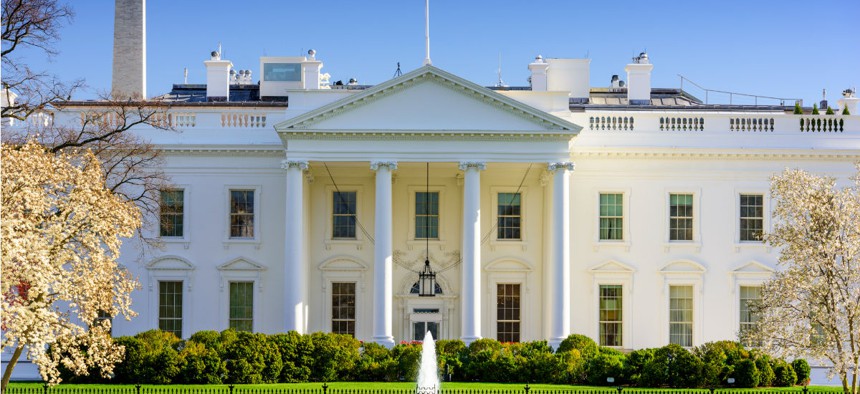The White House Is Not Complying With Inquiries From Government’s Top Watchdog
The Trump administration did not respond to a GAO letter about not responding to its investigations.
The White House is ignoring requests from the government’s chief watchdog, according to a letter from the agency, which said officials are either refusing to cooperate or not responding to inquiries at all.
Government Accountability Office General Counsel Thomas Armstrong made his complaints in a letter to White House Counsel Donald McGahn, which was made public by Democrats on the House Oversight and Government Reform Committee. The unfulfilled requests concerned McGahn’s office and the National Security Council, Armstrong said, who added that he understood it to be White House policy to ignore GAO’s inquiries. Such a directive, he said, marked a “clear departure from past policy.”
GAO’s requests that went unanswered involved a wide range of topics, from NSC’s overseas stabilization efforts to inspector general vacancies to presidential travel.
“I am concerned about the implications of this new policy regarding communication with GAO, particularly in our performance of a core function, namely, contributing to Congress’s constitutional oversight,” Armstrong said. “Given the importance of this matter, I would ask that you correct any misunderstanding that we may have or reconsider this approach to engaging with GAO.”
Armstrong asked McGahn to respond to his letter by May 25. Chuck Young, a GAO spokesman, said the White House has not met that deadline.
While Young said the stonewalling affects a small number of GAO reports, “this area was of particular concern because the lack of responsiveness is a departure from past practice.”
Armstrong’s letter was not the first time the Trump administration has butted heads with the legislative branch agency. In October, GAO released a report on Trump’s transition in which it contacted members of the Trump-Pence Transition Team that had since taken positions in the Executive Office of the President. Those individuals, as well as those in Pence’s office, did not respond to GAO’s request.
Later that month, the Environmental Protection Agency did not provide comments on a draft report or a recommendation on the long-term costs to the government of climate change.
Rep. Elijah Cummings, D-Md., the oversight committee’s ranking member, called those refusals to cooperate “outrageous.” In response to Armstrong’s letter, Cummings and the committee Democrats asked their chairman, Rep. Trey Gowdy, R-S.C., to hold a hearing on the matter to include testimony from McGahn and GAO.
“We are writing to request that you hold an immediate hearing on the dramatic decision by the White House to obstruct investigations by our independent investigators at the Government Accountability Office,” the Democrats said. “The committee must act swiftly to determine who instructed White House staff to refuse to provide information to GAO, as well as to evaluate the justification for this decision and its potential to impair Congress from fulfilling its constitutional oversight responsibilities.”
Robert Shea, who worked closely with GAO as the associate director for administration and government performance at the Office of Management and Budget during the George W. Bush administration and during his tenure on oversight committees on Capitol Hill, noted that Congress is a “co-equal branch of government” and GAO is Congress’ investigative arm.
“Executive branch officials should at a minimum respond to a request for meetings or conversations, and should, unless there is an exception, provide documents,” Shea said.
Doing so, he added, is typically in the agency’s best interest: “It’s not only required by law but it will provide great dividends in ensuring GAO has the full picture and context,” he said. Working with the auditors helps them “understand the executive branch’s point of view and more often than not GAO comes away with the view that the actions the executive branch has taken are reasonable.”
David Walker, who led GAO as comptroller general from 1998-2008 and oversaw a lawsuit to compel Vice President Dick Cheney to release documents regarding his secretive energy task force, recently told Government Executive that his former agency had a process in place for negotiating with agencies that refused to comply. Each project team held weekly meetings to discuss how engagements were proceeding and what challenges were arising.
“We rarely had access problems,” Walker said, “and when we did, we’d try to work through them, and in most cases we were able to.”
He added agency officials usually do not have a choice in complying: “GAO has the right of access to records and individuals to the extent that they are government employees or contractors and dealing with information in its purview.”
Shea said the White House’s refusal to cooperate went beyond the typical disputes he saw during his time at OMB.
“What seems unusual about this letter is GAO’s not quibbling about access to specific documents. That’s routinely what these fights are about,” he said, but in this case, it regards “any response at all.”
Gowdy’s office did not respond to an inquiry about the dispute with GAO or a potential hearing.
Charles S. Clark contributed to this report.
NEXT STORY: Play of the Day: Trump Wrote a Letter to Kim








